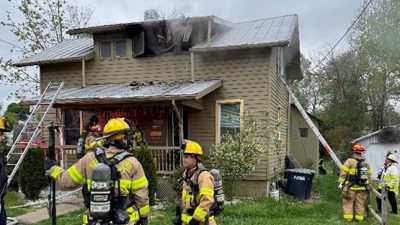Story by Chris Graham
[email protected]

And then I talk to my friend the horror author Matthew Warner, and I start to get depressed.
“I’m trying to break into the paranormal-romance genre, and I’m working on a manuscript there – and that’s only because I think there’s better money in it,” Warner told me.
That, I hope, explains my glum feelings – that my friend the horror author Matthew Warner is aspiring to be my friend the paranormal-romance author Matthew Warner.
His books make it so that I have to sleep with the lights on at night – and he’s thinking of jumping ship?
“Horror’s going away,” said Warner, who relocated to Staunton a couple of years ago from Northern Virginia. “There’s not as many bookstores using horror as a label, and I’m kind of tired of fighting against the whole perceptions of the genre. I get up and give speeches and give talks at libraries and in schools, and I’m realizing that they’re all running along the lines of apologias. And I said to myself, Everybody understands romance, and they’re buying that up.”

“I don’t think it’s any harder than it was – any more than any other genre,” the Bram Stoker Award winner said of the horror business, which experienced a bit of a heyday in the 1970s and 1980s when Stephen King started scaring the bejeebies out of the rest of us.
“I have other friends who write children’s books and write mainstream – different things from what I write. And they’re all saying the same thing – that publishers now are more media-driven than they’ve ever been before. They want to publish the next celebrity’s novel. They want to publish the next book that has something to do with current popular trends. Media is driving book publishers more than ever before. So it’s not that publishing in the genre is tougher – it’s that publishing in general is tougher,” Massie said.
That’s probably as much a function of the hypercompetition for the publishing dollar as anything else. Despite my assumptions about book sales and reader interest being down, down, down, the data from researchers at the Book Industry Study Group and the Association of American Publishers, to cite two sources, seem to indicate that the industry is as strong as ever moneywise.
In the context of that information, then, it would seem to me that my friends in horror would be doing quite well for themselves. I mean, seriously – just look at the popularity of, say, horror movies, and horror-themed video games.
Obviously society’s appetite for being spooked out of its collective gourd is alive and well. So the people who dream up the evil that can be done should be doing quite well for themselves.
Right?
“There are a lot of movies out there in science fiction, fantasy and horror – and if you didn’t know any better, you’d think it was a great time to be writing science fiction, fantasy and horror. But what the movie folks are doing is they’re coming up with movies based on video games and TV shows – and the publishing industry, from my experience, is leaning more that way, too. They want to do things that are like this movie or like this TV show – rather than publishing something that’s just good within the genre,” Massie said.
So that’s one factor. Another dates back to the rise of Stephen King – when everybody and their brother started writing horror because it seemed to be the thing to do.
Exacerbating that was the rise of desktop publishing – which has lowered the bar for getting a book into circulation basically to ground level.
“I think in desperation a lot of people in the horror genre have either gone to the self-publishing route or smaller presses – not that smaller presses aren’t good, but a lot of smaller presses these days are not much more than self-publishing. And in horror, there are a lot of wonderful small presses and specialty publishers who do quality stuff that nobody else will touch – but in horror, it’s unique, because that’s where you get the people who are desperate to publish, but they may not be all that good. But they get their books out – high-school kids who think a novel needs to be nothing but blood, guts and gore, and they find a friend who will publish their book, and then all the sudden, because there’s more and more of that now, it gives the horror genre, which already has a relatively shaky name, a worse name,” Massie said.
“The genre is losing whatever respectability that it might have had because of how easy it is for people to put out their own books. Since anybody can do it now, it gives everybody a bad name,” Massie said.
Which brings me back to how my friend the horror author Matthew Warner is dreaming of ways to Harlequin-up his writing.
“What’s happening now is horror is becoming romance,” Warner said. “Now we have this whole new subgenre called paranormal romance – and there are just tons of people writing it, and there are a ton of books coming out, and people are reading it. And they sort of run the gamut. Reading these novels, you could be reading a trashy – I don’t mean to slander Harlequin, but some of them really are trashy – and then you get into the paranormal stories, and people are really re-exploring and rediscovering the things that have been familiar in the horror genre for a long time, especially vampires and werewolves, and they’re coming at it from a fresh perspective.
“Which poses some interesting questions from genre theory. What is romance? What is horror? Just because you have a vampire or a werewolf, does that make it a horror story? I think really the answer is no – it’s to whatever purpose you’re writing towards,” Warner said.
“If your purpose is to examine the causes of fear and/or to evoke fear, no matter how you do it, it’s a horror story. If your purpose is to examine relationships and love and the human heart, then even if you co-opt the tools of the horror genre, which would be werewolves and vampires and ghosts and angels and things like that, that’s still a romance story,” Warner said.
Yes, it is.
Still a romance story.
Chris Graham is the executive editor of The Augusta Free Press.










